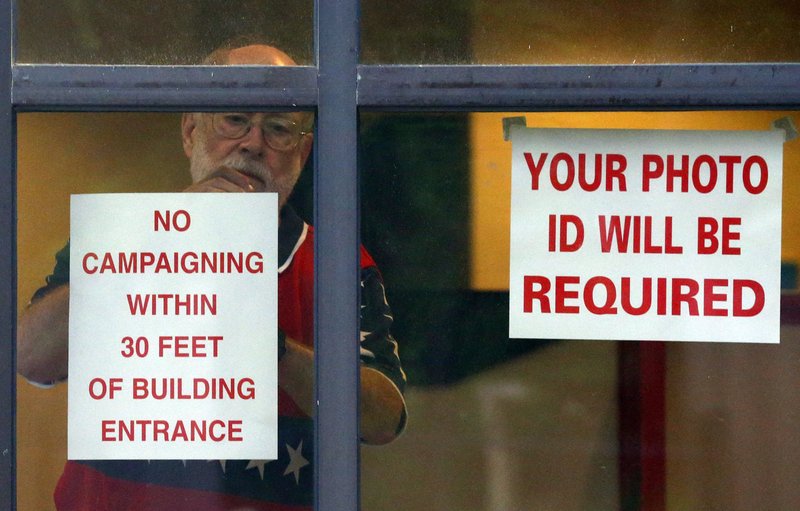MONTGOMERY, Ala. -- U.S. Sen. Luther Strange and former Alabama Chief Justice Roy Moore are headed to a Republican primary runoff in the race for the Senate seat previously held by Attorney General Jeff Sessions.
The two men, who represent different factions within the Alabama Republican Party, will face off in a Sept. 26 runoff after neither captured more than 50 percent of the vote.
Strange, who was appointed to the Senate seat after Sessions resigned, was forced into the runoff with the firebrand jurist despite an endorsement from President Donald Trump and heavy investment by a super political action committee with ties to Senate Majority Leader Mitch McConnell.
The winner will face Democratic nominee Doug Jones in a December election.
Moore, who was twice removed from his duties as chief justice for his stances supporting the public display of the Ten Commandments and against gay marriage, expressed optimism Tuesday after a horseback ride to his polling place, an election day tradition of his.
"We look forward to registering our vote to make this country great again, to make it good again. And we're looking forward to voting and hope we have a good turnout today, because I know there's a lot of motivation out there to change Washington," said Moore, wearing a black T-shirt that said "military police" and a black cowboy hat.
Moore, with 40 percent of the vote, was leading Strange by 8 percentage points late Tuesday with 93 percent of the precincts reporting.
Strange had emphasized his Trump endorsement but had acknowledged all along that a runoff was likely because of a crowded GOP field.
"The final pitch is: Listen to President Trump. The key is someone who will support him in Washington. He's endorsed me," Strange said as he encouraged Alabamians to get out and vote.
The Alabama vote was the most high-profile election since white supremacists were blamed for deadly violence in Virginia over the weekend, but the GOP contenders avoided criticizing Trump's delayed condemnation of the hate groups involved.
Trump's approval rating has hit a new low of 34 percent, according to Gallup, but strong currents of support still flow through the Republican electorate in Alabama, where the GOP candidates went all-out to attract Trump voters and castigate the Washington, D.C., "swamp."
Trump recorded a Monday night robocall urging voters to choose Strange.
Voting was steady at Saint James Methodist Church on the outskirts of Montgomery, where retired teacher Tommy Goggans said he turned out specifically "to keep Roy Moore from getting it," because "he's been kicked out of everything he's done."
In the rural community of Gallant in northeast Alabama, Jimmy Wright, 41, showed up early Tuesday to vote for Moore.
Aside from being a neighbor, Wright said, he likes the way the former justice conducted his campaign.
"He's the only one who hasn't been talking crap about the others," Wright said. Trump's support for Strange didn't matter to him, he said.
U.S. Rep. Mo Brooks, a GOP challenger who finished third, had hammered at Strange's support from McConnell, asking voters to send a message that "our Alabama Senate seat cannot be bought by special interests in Washington D.C." The super PAC had spent $2.5 million on TV ads to support Strange.
Commending both of his opponents' campaigns after conceding Tuesday, Brooks called Moore honest and congratulated Strange for fighting "very, very hard." He also declined to endorse either candidate, instead exhorting voters to "make a principled decision."
Strange was Alabama's attorney general before he was appointed to the Senate in February by Gov. Robert Bentley, who soon resigned in scandal. Strange said he did Bentley no favors, but his challengers questioned the ethics of seeking the appointment while investigating the governor.
On the Democratic side, Jones, a former U.S. attorney during President Bill Clinton's administration, was backed by former Vice President Joe Biden and some other national party figures. He is perhaps best known for leading the prosecution of two Klansmen for the 1963 bombing of a Birmingham church that killed four girls.
While Alabama has not elected a Democrat to the U.S. Senate in more than 20 years, Jones has said Democrats must not concede the seat without a fight. He said Democrats can win if they can turn the conversation to "kitchen table issues" such as wages, health care and jobs.
Information for this article was contributed by Jay Reeves of The Associated Press and by David Weigel of The Washington Post.
A Section on 08/16/2017

